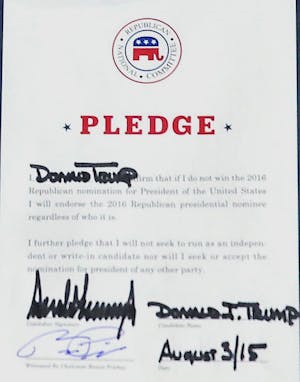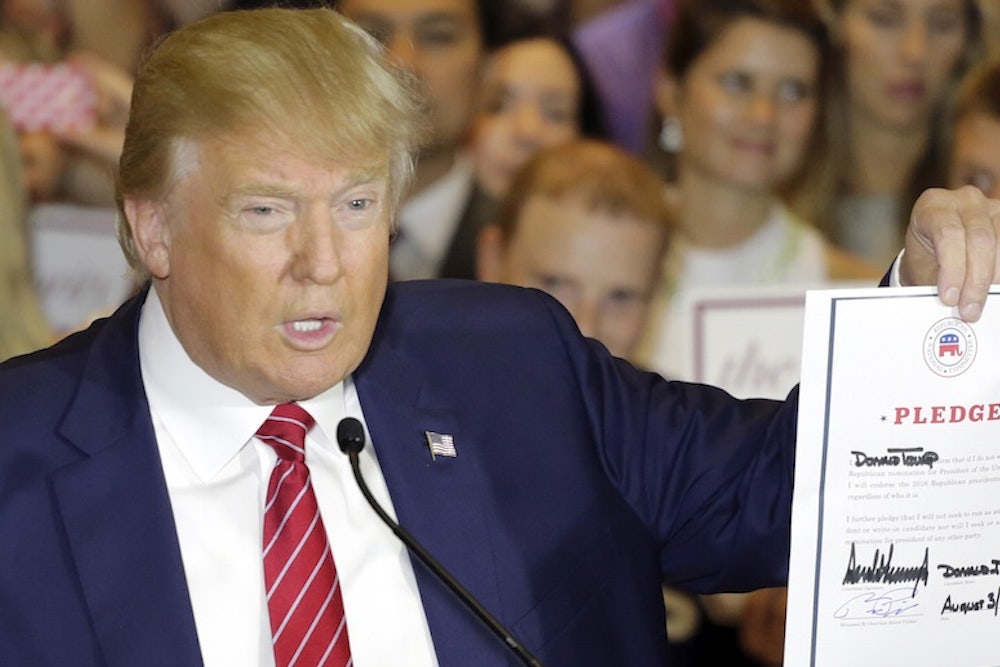On Thursday, Donald Trump signed a loyalty pledge to the Republican Party, stipulating that he would support whoever becomes the GOP's presidential nominee and foreclose the option of mounting an independent or write-in or third-party candidacy. The purpose of the pledge was to bring Trump to heel. By announcing his decision publicly, and holding the signed pledge up to a thousand cameras, Trump gave the Republican party readymade and provocative attack ad material: In the event that he shirks the agreement, and mounts an independent candidacy at some point, Republicans can air footage that proves Trump broke his word.
There may be some solace in that, but the fact that he was willing to sign the pledge at all should alarm Republicans more than it soothes them. Trump wasn’t communicating to the party that its knock against him for threatening an independent run has been effective. To the contrary, it's that he doesn’t think the threat is necessary anymore—that he’s now genuinely well-positioned to win the primary, rather than an insurgent threat who can be neutralized by party heavyweights.

This isn’t just a matter of polling—though the polling is consistent with it—but of the way Trump speaks about the pledge itself. He clearly doesn’t see it as an inviolable agreement, but rather as a way to keep the Republican Party from organizing to sabotage his candidacy.
“I really got nothing,” Trump said at a Thursday press conference in New York, speaking about his meeting with Republican National Committee Chairman Reince Priebus. “Absolutely nothing other than the assurance that I would be treated fairly…. I have no intention of changing my mind.”
He got nothing, in other words, aside from an all-purpose and unchallengeable exception, which will force party officials to constantly police one another to make sure they don’t give Trump the excuse he’ll need to launch an independent campaign.
Trump is now operating entirely from a position of strength.
As Slate’s Josh Voorhees noted, over the course of three months, the percentage of likely Iowa caucus goers who told survey takers for Bloomberg and the Des Moines Register that they would “never” support Trump collapsed, from 58 down to 29 percent. A nationwide Monmouth poll of Republican voters conducted a few days later found that Trump has completely reversed his dangerously low net favorables, from 20-55 in June to 59-29 today.
In head-to-head matches with nine other Republican candidates, Trump beats everybody except for Ben Carson. He trounces Jeb Bush 56-37, Marco Rubio, 52-38, and Scott Walker, 53-38, suggesting that as the field winnows, dark horse backers are more likely to migrate to Trump than to any of the establishment-friendly candidates.
This is in some ways no surprise. The right-wing vote has been a majority share of the primary electorate since the campaign began. But building a majority for an anti-establishment candidate seems easier than ever before. It can now be achieved, per Matt Bruenig, by combining the support of just three candidates: Trump, Carson, and Ted Cruz.
A few weeks ago, the best argument that Trump couldn’t win the nomination rested on the premise that his maximum support was too low, and that the party would array against him aggressively as the field narrowed. Trump has spoiled both premises. It is now easy to imagine Trump eclipsing 40 percent of the vote before the primaries begin, and ripping up that pledge if a panicky Republican Party responds by erecting obstacles to his victory. Right now, in the GOP primary campaign, the most pressing question has nothing to do with Jeb Bush or Marco Rubio or any of the people who were supposed to win. It’s whether Ben Carson can keep up the fight, or Donald Trump runs away with it.
